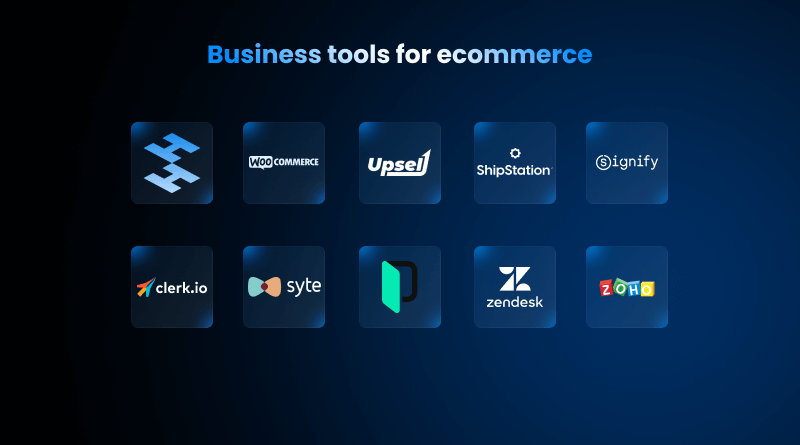E-commerce is reinventing the way consumers shop. However, this contemporary form of shopping faces the problem of negative customer experience, lack of sufficient inventory, unreliable eCommerce hosting, and similar problems. This in-depth guide will unlock the mysteries behind the business tools of eCommerce that are transforming your landscape online store giving you the edge needed to survive in the online market.
Table Of Content
Why You Need Business Tools In Your Ecommerce
– Streamline Operations
Tools manage the routine processes of a firm, such as the development of online stores, handling of inventory and payment processing.
– Increase Sales and Productivity
eCommerce tools automate operations and lessen workloads so that you can focus on growth and sales.
– Enhance Customer Service
Through instant customer service and CRM information, you can deliver to your customers a convenient personalized shopping.
– Drive Data-Driven Decisions
Tools provide valuable insights through analytics and reporting on marketing, sales, and customer engagement, allowing you to make informed decisions to optimize performance.
Top Ecommerce Business Tools

1. WooCommerce
WooCommerce is the first choice for eCommerce store owners. Its compatibility with WordPress makes no scalability challenges. WooCommerce offers excellent ease of use for those familiar with the platform. It is free for beginners, but you must purchase upgrades to access premium features. The freemium WordPress plugin offers advanced features that make providing coupons, discount codes, or rebates for orders with specific conditions or free shipping easy. All those work like a magnet for customers, boosting your sales.
2. Hydrogen
Financial technology is an integrated part of the eCommerce business. Hence, Hydrogen fuels the economic operations of e-store. It saves 80% of cost and time in the checkout process. It seamlessly integrates with other apps that don’t require coding. You can implement the tools into the store in minimal time without any technical expertise. Capitalize your fintech activities on the eCommerce store for a smooth user experience with Hydrogen.
3. Upsell
The right way to increase eCommerce sales on the website is to upsell consumers who already buy. Bold Commerce’s Upsell integrates with the Shopify store and encourages people to add more items to the cart. It includes plenty of consumer-friendly features with attractive deals. It raises the upselling chances by giving complete designing control. It allows you to customize pop-ups to give your e-store a more aesthetic look. You can also decide how to display prices or hide out-of-stock options. While Upsell is only available as a Shopify add-on, it can considerably help make more sales.
4. ShipStation
ShipStation is an ideal eCommerce tool that comes with a dedicated mobile app to monitor shipped orders. This shipping software offers an uncomplicated shipping system to buyers and shoppers. Any shipping disruption can be resolved immediately by responding to the buyer’s query through the dashboard. ShipStation is a highly rated ecommerce tool that is used by millions of people globally.
5. Signify
E-commerce websites are victims of cybercrimes. Hackers infiltrate a consumer account, and the user may stop shopping with you because of a security red flag. Signify, like an SSL certificate, offers an end-to-end commerce protection platform to prevent fraud so you don’t encounter these problems. The Signifyd platform is largely automated, but you can customize logic and responses to work best for your site. You can also use the service’s reporting tools to understand recent actions and trends on your platform. It may entice users to shop with you more if you publish these statistics.
6. Clerk.io
Clerk.io grows your online business with the personalized customer shopping experience. The AI algorithm analyzes consumer behavior and transactions across channels to generate personalized content, results, and recommendations. All these factors boost conversions and engagement. Clerk.io is one of the best AI tools for eCommerce to automate email marketing efforts, using triggers to send personalized product recommendations.
7. Syte
SEO, visual search, and on-site navigation in Syte help consumers find the product that is required. Moreover, it uses hyper-personalization to show them similar and complementary products. With its visual AI feature, a better consumer journey is created for optimal conversions. Online retailers dealing with home décor, fashion, and jewelry use Syte to create a finished product.
8. Phrase
Phrase is an AI tool to create customized and effective marketing copies. It predicts the best-performing content that helps you gain the best results. You can use Phrase to generate personalized content for a variety of use cases, such as email subject lines and body copy, SMS messages, and paid advertising to boost brand awareness and customer engagement.
9. Zendesk
Zendesk is a leading customer service platform that supports businesses in managing service requests and grievances. The live service is impressive, and the platform is easy to navigate. It contains tools that allow you to analyze data from tickets and interactions to identify performance and efficiency. Zendesk has more flexibility for customizing workflows and has add-ons to enhance functionality.
10. Zoho Campaigns
Create appealing and beautiful email campaigns for eCommerce brands. With this platform, you can add, manage, or segment email subscribers before you click send on a campaign. The platform has exciting components such as advanced analytics, send time segmentation, and deliverability infrastructure that supports Zoho Campaigns as leading email marketing platform for eCommerce.
How to Choose the Right Ecommerce Tools?
- Determine Your Budget and Scalability Needs: Consider how much you can afford to spend initially and monthly (subscription fees, transaction costs, app costs).
- Consider Design Flexibility and Customization: Designing your store is essential to your brand and customer interactions. Evaluate the flexibility, quality, and price of themes and templates available from the ecommerce platform.
- Consider Customer Support and Community: A stable support system is necessary, especially if a technical problem arises. Look for platforms that provide reliable 24/7 support through a range of channels.
The way you use business tools can mean the difference between running a shop and running a business online. E-commerce business tools help to run smarter instead of harder, to leverage automation in inventory, and use AI based analytics. It can automate work, increases customer participation and creates usable insights for store owners to build confidence and make data-informed decisions.
Finally, embracing modern e-commerce tools is not only an efficiency endeavor but also an evolutionary requirement. With the increase in the customer expectations and online competition, the investment in the relevant technology ensures that the brand will be nimble, relevant, and customer-focused. The business is redefining the dynamics of the online store in the present to set the stage for a more profitable, scalable, and future-fit e-commerce business in the future.
FAQs
1. What are e-commerce business tools?
E-commerce business tools are digital solutions that assist with online store operations such as inventory management, payment processing, marketing, and customer service.
2. Why are e-commerce tools for online stores important?
They make complex tasks easier, thus improving efficiency and customer experience that can lead to increase in sales.
3.What are the essential e-commerce tools?
Essential tools in e-commerce are customer relationship management (CRM) software, payment gateways, analytics tools, and marketing automation solutions.
4. How do e-commerce tools help increase revenue?
They make businesses more efficient, personalize marketing efforts, and provide analytics and data to generate higher conversion rates and customer retention.














